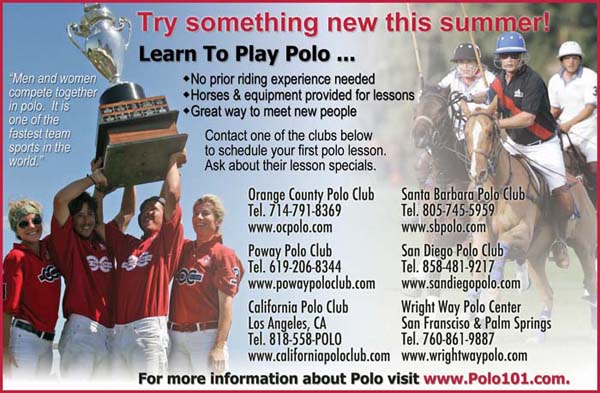Learn about the game of polo, the people who play it and the social aspects of the sport.
By Lynn Bremner
(To be published in July 2010 Issue of Riding Magazine)
When the sport of equestrian polo is mentioned it evokes images of royalty and the mega wealthy, mounted on fast, well-bred horses as they compete in a game that is out of reach of the general population. What most people don’t realize is that polo is not being played in faraway lands by kings and Maharajas; it is being played in small towns across America by local equestrians.
California boasts the largest circuit of polo clubs in the United States with 34 United States Polo Association (USPA) Member Clubs located within the state. The temperate climate in California is a benefit for polo players as it allows for a longer polo season when compared to other states.
Equestrians are drawn to polo for several reasons. Unlike most other equestrian sports, polo is a team sport where men and women can compete with and against one another. The team aspect of polo enables friends, couples and families to compete on the same team or against each other. Riders can enjoy the benefits of being part of a team versus individual competition. Participation in this noble game introduces new friends and creates the possibilities of international bonds. Winston Churchill once said “A Polo handicap is your passport to the world,” and he was right. Polo opens the doors to an International network of polo clubs, players and new opportunities.

Polo is a family affair! Father-daughter duo Shelley and Denny Geiler play polo together. Left to right: Shelley Geiler, Erik Wright, Caroline Anier, Denny Geiler and his wife Joanne.
While polo has historically been a sport dominated by male players, this is no longer the case. Women currently represent the fastest growing sector of the polo industry, accounting for 32% of USPA Playing Members. Polo is equally appealing to both genders. Men are drawn to the speed, competition and image of polo. It is, after all, one of the fastest team sports in the world. The uniforms are casual and not off-putting. A pair of clean white jeans and a polo jersey are all that are worn. Pull on a pair of brown riding boots, a polo helmet, a pair of knee guards and you are ready to play. Men often start polo with little or no riding experience. They learn to ride while they learn to play. It may take them a little longer to learn the game, but they get up to speed quickly.
Women also find the competition and speed exciting. Many of the female polo players have previously competed in hunters/jumpers, dressage and eventing. Their discovery of polo opens new ways for them to enjoy horses, competition and meet new people.
Another aspect of polo that is attractive to equestrians is the additional riding time that polo provides. Each player usually has been 4 and 8 horses depending on what type of polo they play. Both the players and horses need to practice during the season with stick and ball sessions and practice games. There are usually two tournament games during the week. This appeals to players because they have more horses to ride and they can spend more time at their polo club which can be a very enjoyable, social environment. Games run between 1 to 1.5 hours each and players are actively competing throughout the duration of the game. When compared to the 1.5 to 2 minutes a jumper or dressage rider has in the show ring during a class, it is a significant difference.
No longer the restricted environment of the rich, today’s polo players come from different backgrounds and income levels. Some players are teachers, real estate agents or own small businesses. Others are doctors, lawyers, investment bankers, developers or CEO’s at large corporations. What they all have in common are the love of horses, a passion for the game and a desire to compete.
Polo is a small industry that fosters friendships and connections with players from across the country and around the world. The polo environment breeds a social side that can involve parties, BBQ’s and other social events. The camaraderie of the game is a big part of what makes it so enjoyable. Even if you don’t play polo, you will enjoy the festive spirit that radiates from the polo community.
If you would like to try polo, please contact one of the polo clubs listed on the Polo 101 “Learn To Play Polo” tab. Ask each club what their lesson specials are for new students. San Diego Polo Club and Poway Polo Club offer the first lesson free to new students. Orange County Polo Club, and California Polo Club (Los Angeles), Empire Polo Club and the USPA Regional Polo Centers offer a 2 for 1 lesson special.





Actually, it’s no less than a way of life.